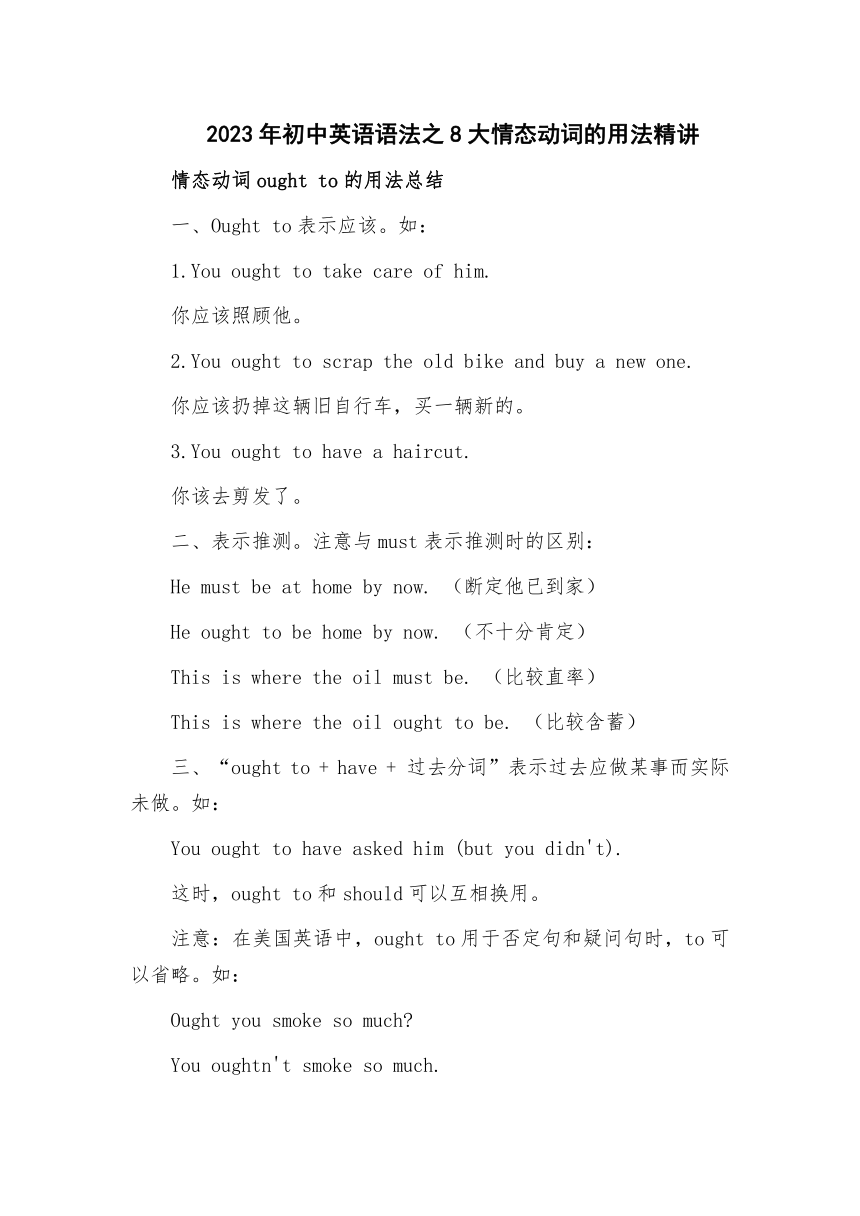
2023年初中英语语法之8大情态动词的用法精讲 情态动词ought to的用法总结 一、Ought to表示应该。如: 1.You ought to take care of him. 你应该照顾他。 2.You ought to scrap the old bike and buy a new one. 你应该扔掉这辆旧自行车,买一辆新的。 3.You ought to have a haircut. 你该去剪发了。 二、表示推测。注意与must表示推测时的区别: He must be at home by now. (断定他已到家) He ought to be home by now. (不十分肯定) This is where the oil must be. (比较直率) This is where the oil ought to be. (比较含蓄) 三、“ought to + have + 过去分词”表示过去应做某事而实际未做。如: You ought to have asked him (but you didn't). 这时,ought to和should可以互相换用。 注意:在美国英语中,ought to用于否定句和疑问句时,to可以省略。如: Ought you smoke so much You oughtn't smoke so much. 四、ought和should的区别: ought语气略强,should较常用;ought在美国英语中用的很少,而should却相当常用; ought属正式用语。由于ought to 没有过去式,所以在直接引语变间接引语的过程中,就不再变化.例如: 1.She failed one of the exam papers, but we ought to make allowance for the fact that she was ill. 她有一门不及格,但我们必须考虑到她当时有病。 2.Regularity ought to be observed, as regularity is very conducive to health. 生活应遵守规律,因为规律对健康有益。 3.China ought to make a greater contribution to humanity. 中国应当对于人类有较大的贡献。 4.He is a very good tennis player; you ought to see him in action. 他是个很好的网球运动员,你应当去看看他打球。 5.I think there's a train at 8.20 but you ought to make certain. 我想8点20分有一班火车,不过你应该打听清楚。 6.I think you ought to go to/to go and see the doctor. 我认为你应当去找医生看看病。 情态动词should的用法总结 一、Should表示义务、责任、劝告、建议,其同义词是ought to;在疑问句中,通常用should代替ought to.例如: You should go to class right away. 你应该马上去上课。 Should I open the window 我能打开窗户吗? 二、Should的含义较多,用法较活,现介绍三种其特殊用法。请看下面的句子: 1.I should think it would be better to try it again. 我倒是认为最好再试一试。 2.You are mistaken,I should say. 依我看,你是搞错了。 3.I should advise you not to do that. 我倒是劝你别这样做。 4.This is something I should have liked to ask you. 这是我本来想问你的。 从以上例句可以看出:情态动词should用于第一人称时可以表示说话人的一种谦逊、客气、委婉的语气。 三、Should还可以用在if引导的条件从句,表示一件事听起来可能性很小,但也不是完全没有可能。相当于“万一”的意思。从句谓语由should加动词原形构成,主句谓语却不一定用虚拟语气。如: 1.Ask her to ring me up if you should see her. 你万一见到她,请让她给我打个电话。 2.If you should change your mind,please let us know. 万一你改变主意,请通知我们。 3.Should I (If I should) be free tomorrow I will come. 万一我明天有时间,我就来。 四、此外,Why(or How) + should结构表示说话人对某事不能理解,感到意外、惊异等意思。意为“竟会”。如: 1.Why should you be so late today 你几天怎么来得这么晚? 2.— Where is Betty living — 贝蒂住在哪里? �——— How should I know — 我怎么会知道呢? 3.I don't know why you should think that I did it. 我真不 ... ...
~~ 您好,已阅读到文档的结尾了 ~~

